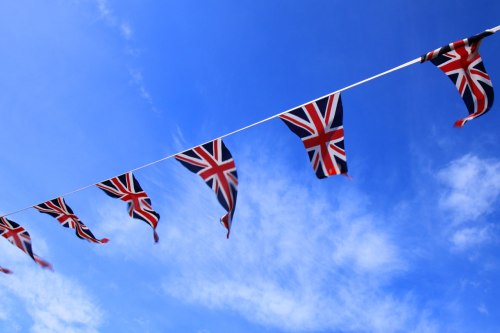What color is pride? For many baby boomers like me, I’ll bet the first thing that comes to mind is red, white, and blue. With stripes. Growing up in the post World War II era, the whole country was awash in the hues of Old Glory.
My father, being a Texan, had his own proud blend of red, white, and blue. As kids, we had a fine selection of confederate flags, which we draped over plastic replicas of General Lee’s horse Traveler, raised on toothpicks over little statues of the Alamo, and wore as magical capes as we pranced around the house fighting bad guys.
I was told that being half-Texan meant I could do just about anything I put my mind to. Bigger and better than anyone else.
My mother, on the other hand, was brought up under the red, white, and blue of England’s flag and passed on the idea that while we were better than everyone else, we were never to say so. “Don’t brag, it’s unbecoming,” was followed by, “No, dear, you mustn’t play with them — they are not our kind of people.”
What’s worse? My Dad’s resounding pride or my Mom’s false humility?
Oh well. My childhood understanding of pride may have been confused, but at least it all fell under red, white, and blue, so there was no question about the color of pride.


The British are coming, the British are coming!

Until Vietnam. That’s when those colors began to divide America and my family. I sided with my older hippy brother over my Commie-fearing father, and my understanding of the color of pride morphed into a bright tie-die unity with the anti-war crowd. Proud to be a pacifist, proud to be against the machine, against the system. Proud to “let my freak flag fly,” as Crosby, Stills, Nash, and Young put it in their song, “Almost Cut My Hair.”
Going Green
When the environmental movement took off, my sense of pride took on shades of green. In college, I began marching under the green and white eco-flag.
In surveys I did while working at the Sierra Club, we often found that people associated the word “environmentalist” with “arrogance,” and I can understand that. There’s an odd, almost combative pride that develops when people are devoted to a cause they feel means life or death. That’s particularly true when for policy reasons, they must define “the solution” and push for it, which comes across as “we know best.”
Still, the way I see it, when you are up against an opposing force that simply denies the reality of biology, climatology, or any other kind of science for that matter, it does no good to search for a “middle ground” — you have to push if you love humankind and the rest of creation. So I’m still green and proud of it.

Marching under the Green Flag
A Child of the Universe
Speaking of loving humankind — in my thirties, I chose a path that truly confused my notions of pride. I became a committed Christian, which meant that I got serious about being open to personal transformation and healing. I had to lay down the prideful ego that, unbeknownst to me, had been driving my life up until that point.
When God was gracious enough to show me how much my ego and my need for recognition and esteem drove my actions, I was disgusted and dismayed and quite willing to change. I wanted to tear out the thick black threads of pride that ran through my being, binding me up and making me dance like a marionette to the tune of other people’s opinions.
At the same time, if you dare to believe that you are a beloved child of the Creator of the Universe and that you — yes, you — are unique and uniquely gifted in all of history, part of a cosmic plan to make the world a better place, well . . . well, just wow.
That’s a different color pride.
As I’ve gotten to know myself in the light of Love, I have become gentler with myself. Like any child, I have built-in needs for affection and approval. That’s OK; that’s sweet. I believe those needs are driven by our natural inclination to be close to God and to other people. (And, yes, also by our evolutionary need for survival in community, which I don’t think is contradictory to the God-part. We are wired that way by the Master Electrician.)
These natural emotional needs simply get warped by the world. Now that I’m aware of this, I keep watch, and on a good day these traits don’t run my life. I can smile fondly at them and go about my business. I think that somewhere in the dynamic tension between our beloved uniqueness and our egoic drive lies a perfect balance of pride that is pure white like a dove in the sunshine, or perhaps transparent, clear as a pristine stream.
I’m nowhere near that color pride, nor do I expect to be in this lifetime.

Abundant Yellow
Right now, I am experiencing pride as yellow — bright sunshine yellow. It is warm. It is glowing. It is good.
Last week, I graduated from Johns Hopkins with my Masters in Creative Nonfiction and gave a public reading from my thesis for close to two hundred people. I did well. People smiled and nodded and laughed in the right places. Am I proud of myself? Damn straight! I busted butt for four years to get to that podium, and I think I did a really good job. (Sorry, Mom, I know I’m not supposed to say that.)

At the Podium
Thing is, everyone else in my graduating class of sixteen also did a really good job. I’m super proud of them, too. We’re all standing in this sunny pride. There’s plenty of it to go around, enough of the good pride for everyone — it’s not something to clutch. It bathes the whole world in its warmth. We all glow from it. I think it comes from God, and I think it’s related to love. Which raises the question, what color is love? Another post.
Speaking of love, as I was writing this, my blog stats reached three thousand followers, adding to my golden glow. Thanks so much to all of you for accompanying me on my writing journey! I love you guys!!
And now, after that commercial break for a moment of pride, I will return to my false humility.
Related posts:
https://melanielynngriffin.wordpress.com/2012/10/19/what-color-is-shame/
Photo credits: Wikimedia.com, Public Domain Photos, Publicdomainpictures.net





























